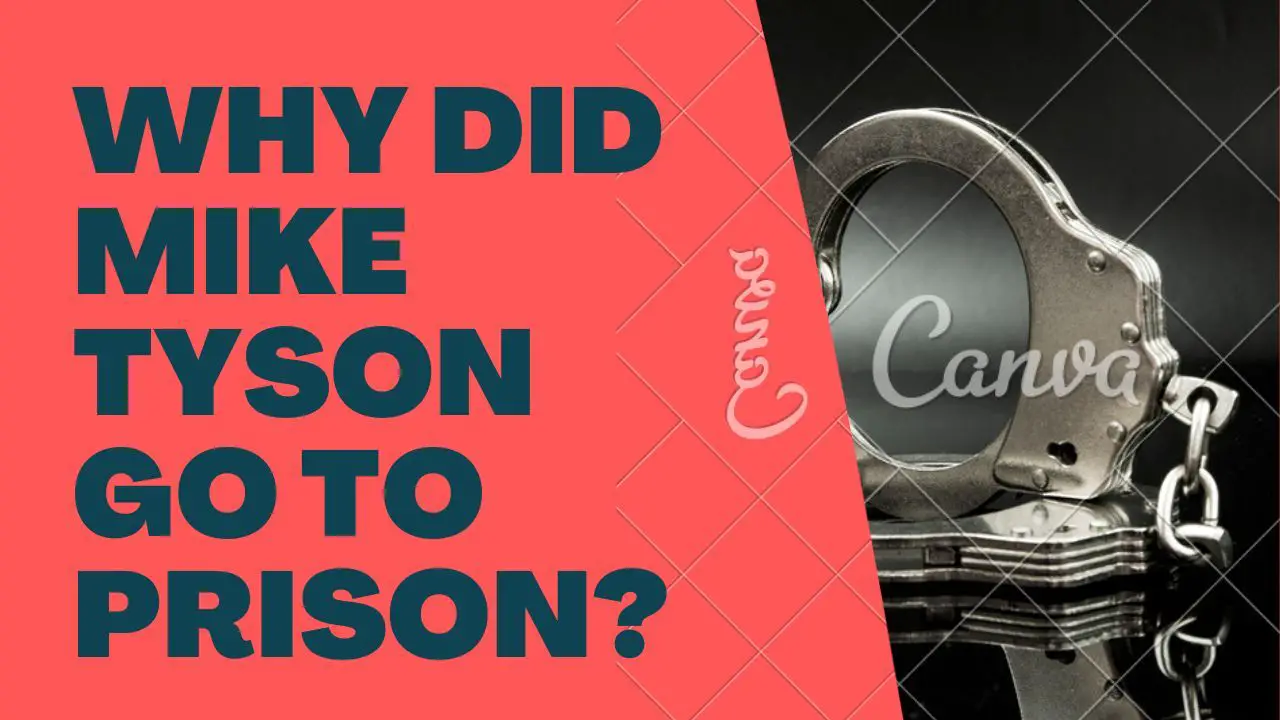Mike Tyson, one of the most iconic boxers in history, faced a significant downfall when he was sent to prison. The story behind why Mike Tyson went to prison is filled with controversy, legal battles, and lessons that continue to resonate today. In this article, we will delve deep into the events that led to his imprisonment and explore the aftermath of this dark chapter in his life.
Tyson's journey from a world champion boxer to a convicted felon is a tale of power, fame, and the consequences of unchecked behavior. Understanding why Mike Tyson went to prison is crucial not only for boxing enthusiasts but also for those interested in the complexities of celebrity life and the justice system.
This article aims to provide a comprehensive overview of the events leading to Tyson's imprisonment, examining the legal proceedings, public reactions, and the lessons learned. By the end, you'll have a clearer understanding of why Mike Tyson went to prison and the impact it had on his life and career.
Read also:Exploring The Impact Of Kabc 7 Los Angeles On Local News And Beyond
Table of Contents
- Biography of Mike Tyson
- Why Did Mike Tyson Go to Prison?
- Legal Details Surrounding the Case
- Mike Tyson's Prison Experience
- Impact on Tyson's Boxing Career
- Public Reaction and Media Coverage
- Tyson's Rehabilitation and Redemption
- Lessons Learned from Tyson's Imprisonment
- Mike Tyson's Legacy
- Conclusion
Biography of Mike Tyson
Early Life and Career
Before diving into why Mike Tyson went to prison, it's essential to understand his background. Born on June 30, 1966, in Brooklyn, New York, Tyson grew up in a tough neighborhood. His early life was marked by struggles, but he found solace in boxing. Under the guidance of legendary trainer Cus D'Amato, Tyson quickly rose through the ranks, becoming the youngest heavyweight champion in history at just 20 years old.
Bio Data
| Full Name | Michael Gerard Tyson |
|---|---|
| Date of Birth | June 30, 1966 |
| Place of Birth | Brooklyn, New York, USA |
| Height | 5'10" (178 cm) |
| Weight | 218 lbs (99 kg) |
Why Did Mike Tyson Go to Prison?
The question of why Mike Tyson went to prison is rooted in a high-profile sexual assault case. In 1992, Tyson was convicted of raping Desiree Washington, a beauty pageant contestant, after a party in Indianapolis. This incident marked a turning point in his life and career, leading to a six-year prison sentence, of which he served three years.
Legal Details Surrounding the Case
The Incident
The events leading to Tyson's imprisonment began during a beauty pageant in Indianapolis. After the event, Tyson invited several women, including Desiree Washington, to a party at a local hotel. Washington accused Tyson of raping her in his hotel room, leading to his arrest and subsequent trial.
The Trial
Tyson's trial was a media spectacle, with extensive coverage and public interest. The prosecution presented evidence, including testimony from Washington, while Tyson's defense team argued that the encounter was consensual. In the end, the jury found Tyson guilty, and he was sentenced to six years in prison.
Mike Tyson's Prison Experience
Life in prison was challenging for Tyson. During his incarceration, he faced numerous difficulties, including adapting to the prison environment and dealing with the loss of his freedom. However, Tyson used his time in prison to reflect and grow, engaging in activities such as reading and writing.
Rehabilitation Programs
- Participated in educational programs
- Engaged in self-reflection and personal development
- Developed a deeper understanding of his actions and their consequences
Impact on Tyson's Boxing Career
Tyson's imprisonment significantly impacted his boxing career. Upon his release in 1995, he faced challenges regaining his title and rebuilding his reputation. The boxing world had changed during his absence, and Tyson struggled to adapt to the new landscape. Despite these challenges, he managed to stage a comeback, showcasing his resilience and determination.
Read also:Stay Safe And Informed Navigating Colorado Road Conditions In 2023
Public Reaction and Media Coverage
The public reaction to Tyson's imprisonment was mixed. While some condemned his actions, others believed he was a victim of circumstances. The media played a significant role in shaping public opinion, with extensive coverage of the trial and its aftermath. Tyson's case sparked discussions about consent, celebrity privilege, and the justice system.
Tyson's Rehabilitation and Redemption
After his release, Tyson embarked on a journey of redemption. He worked to repair his image and contribute positively to society. Tyson became involved in various charitable activities and used his platform to advocate for social causes. His efforts demonstrated a commitment to personal growth and making amends for his past mistakes.
Charitable Work
- Supported youth boxing programs
- Involved in anti-bullying campaigns
- Advocated for criminal justice reform
Lessons Learned from Tyson's Imprisonment
Tyson's experience offers valuable lessons about the consequences of one's actions and the importance of accountability. It highlights the need for individuals, especially those in the public eye, to act responsibly and respect others' boundaries. Tyson's journey from champion to convict serves as a cautionary tale for aspiring athletes and celebrities.
Mike Tyson's Legacy
Despite the controversies surrounding his life, Tyson remains a legendary figure in the world of boxing. His legacy is defined not only by his achievements in the ring but also by his struggles and triumphs outside it. Tyson's story is a testament to the power of resilience and the possibility of redemption, even after making grave mistakes.
Conclusion
In conclusion, the question of why Mike Tyson went to prison is rooted in a complex series of events that tested his character and resilience. Tyson's imprisonment was a pivotal moment in his life, leading to personal growth and a renewed commitment to positive change. As we reflect on his journey, we are reminded of the importance of accountability, respect, and redemption.
We invite you to share your thoughts in the comments section below. Did this article provide the insights you were looking for? Explore more of our content for in-depth analyses and inspiring stories. Together, let's continue the conversation about personal growth, accountability, and the power of redemption.
References:

